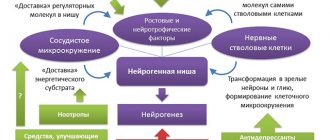General remarks
Man receives all vital resources from the natural environment (water, air, food, energy, building materials, etc.) and returns household and industrial waste to the biosphere, most of which cannot be included in the biological cycle of substances due to foreignness or toxicity. As a result, there is a rapid depletion of natural resources, the extinction of many species of living organisms, pollution and poisoning of the environment with pesticides and radionuclides, and destruction of natural ecosystems (forests, meadows, lakes, rivers, swamps).
Man plows virgin lands, changes river beds, builds transport highways, irrigation systems and hydroelectric dams with huge reservoirs, creates large settlements and industrial enterprises, exterminates wild animals, pollutes the atmosphere, water and soil, etc. All this significantly changes the habitat, disrupts the normal functioning of existing biogeocenoses and even destroys them.
The reason for the conflict between man and the natural environment is that man is both a biological and a social being, and his social needs are much higher than his biological ones . Man replaced the natural environment around him with an artificial one, living in which he acquired relative independence from the vicissitudes of nature.
To prevent an environmental crisis, a person needs to understand the patterns of his interaction with nature, intelligently manage this interaction, regulating all his technogenic activities.
An ecological crisis is a state of the environment when it becomes unsuitable for life of plants, animals and humans.
How to influence people
- 13.07.2016
- Anastasia Belozerskaya
- comments: 0
Methods of influencing people are very popular nowadays - many people want to understand how to influence people, learn how to properly build contacts and find allies in both work and everyday matters. Influence on people is studied by the science of psychology, which has formulated several basic principles on how to influence the human psyche.
The easiest way to influence your interlocutor is to show him your interest in the conversation and establish contact with him.
Also, if you sincerely want to win over your interlocutor, then some recommendations will help you build a positive contact for both.
Ask for a Favor Anyone who has done a favor once will be more willing to do it again. And on the contrary, if a person is obliged to something, then he experiences the opposite feelings. And besides, after asking for a favor, your opponent will think that in the same situation you will respond to his request.
Copy
When communicating, many people automatically copy the behavior, words, expressions, emotions, manner of speech and even gestures of their interlocutor. This unconsciously sets him up to trust you.
Ask for more than you need Ask the person to do more for you than you actually need. Or something impossible. After the first refusal to your request, feel free to ask for what you need - the interlocutor will feel awkward from his first refusal and at the second request he will feel obligated to help.
Opponent fatigue
When asked for a favor, a tired person will most often answer “Okay, I’ll do it tomorrow.” This is explained by the fact that now he does not want to think about anything. The next day, most likely, the promise will be fulfilled, because people generally try to keep their promise, otherwise they feel psychological discomfort.
Offer as a whole Sometimes you need to ask for something on a small scale. This way you will first establish a connection. The principle applies here: if a person helped in a small way, he will be more willing to fulfill a more important request.
Sign language
Use positive body language in your conversation - nodding your head is a sign of agreement. And your interlocutor will be sure that you agree with his opinion. Subsequently, this will help you convince your interlocutor that you are right.
Find out your horoscope of fate
Find out your personal Tarot spread for money
Get Your Astrology Tip of the Day
TaroTaro wishes you success and prosperity. Don't forget to rate the article if you liked it:
Consumption of natural resources
Non-renewable (non-renewable) natural resources are sources of mineral raw materials (coal, oil, gas, sand, clay, gravel, marble, etc.) formed in the earth’s crust over hundreds of millions of years, as well as extinct species of animals and plants (example: annually about 9 billion tons of equivalent fuel are extracted from the earth's bowels and burned; oil reserves on the planet will only last for 50 years, coal - for 150 years).
Renewable (renewable) natural resources - flora and fauna, microorganisms, soil, etc. (example: more than 20 million hectares of tropical forest, the main source of species diversity of life on the planet, are cut down annually).
See the good in people
There is only one way to convince someone to do something: make him want to do it. There is no other way.
Of course, you can use force to achieve your goal, but this will have extremely undesirable consequences.
The eminent philosopher and educator John Dewey argued that man's deepest desire is “the desire to be significant.” This is one of the main differences between humans and animals.
Charles Schwab, who was born into a simple family and later became a billionaire, said:
“The way to develop the best in a person is to recognize his value and encourage him. I never criticize anyone, but I always try to give a person an incentive to work. Therefore I take care to find what is worthy of praise, and have an aversion to finding faults. When I like something, I am sincere in my approval and generous in my praise.”
Indeed, we rarely emphasize the merits of our children, friends, relatives and acquaintances, but everyone has some virtues.
One of the most important thinkers of the 19th century, Emerson once said:
“Every person I meet is superior to me in some area. And I’m ready to learn this from him.”
So, learn to notice and highlight the virtues in people. Then you will see how your authority and influence among your circle will increase dramatically.
Population growth (population explosion)
The biosphere is a self-regulating system, and it strives to establish the number of people at a level corresponding to its capacity. Now there are about 6 billion people living on Earth, and over the past 40 years the population growth rate has doubled.
Biosphere mechanisms that seek to limit the growth of environmental needs of people: a decrease in the production of natural ecosystems, non-inclusion of human-produced pollution into substance cycles, depletion of flora and fauna, deterioration of soil quality, droughts, floods, depletion of natural biological resources (for example, fish stocks), etc. Humanity can resist these mechanisms as long as it has reliable energy sources.
Show genuine interest in other people
One telephone company undertook a detailed study of telephone conversations in order to determine the most commonly used word. This word turned out to be the personal pronoun “I”.
This is not surprising.
When you look at photographs of you and your friends, whose image do you look at first?
Yes. More than anything else, we are interested in ourselves.
The famous Viennese psychologist Alfred Adler wrote:
“The person who shows no interest in other people experiences the greatest difficulties in life. From among such individuals most often come losers and bankrupts.”
Dale Carnegie himself wrote down his friends' birthdays and then sent them a letter or telegram, which was a huge success. Often he was the only person who remembered the birthday boy.
Nowadays, this is much easier to do: just indicate the desired date in the calendar on your smartphone, and a reminder will go off on the appointed day, after which all you have to do is write a congratulatory message.
So, if you want to win people over, rule #1 is: Show genuine interest in other people.
Environmental pollution
❖ The main sources of air pollution: ■ emissions of harmful gases from road, rail and air transport, ■ emissions of harmful gases and aerosols from industrial enterprises. Every year, more than 200 million tons of carbon oxide and dioxide, 150 million tons of sulfur dioxide, 50 million tons of nitrogen oxides, etc. enter the atmosphere.
♦ Consequences of air pollution:
■ the heat transfer regime of the atmosphere is disrupted, as a result of which the temperature on the planet can significantly increase ( greenhouse effect ), polar ice begins to melt and, as a consequence, the level of the World Ocean can rise;
■ oxides of nitrogen and sulfur in the atmosphere combine with water vapor, forming nitric and sulfuric acids, which fall to the Earth in the form of weakly concentrated acid rain. These rains leach the soil, destroy flora and fauna, and have a harmful effect on human health;
■ the content of freons, which destroy the ozone layer, has increased significantly in the atmosphere. As a result, the penetration of short-wave ultraviolet radiation onto the Earth's surface, which is destructive for all living things, is facilitated.
❖ The main causes of water pollution:
■ discharge of untreated or insufficiently treated water by industrial enterprises;
■ washing away mineral fertilizers and pesticides from fields;
■ the entry of oil and petroleum products into water bodies, forming a film on the surface of the water that poisons living organisms and disrupts gas exchange (as a result of which plankton, the first link of the ecological pyramid in the ocean, dies);
■ removal of warm waters by rivers (thermal pollution that disrupts the temperature regime).
♦ The main sources of deterioration and pollution of soil and lithosphere:
■ unregulated use in agriculture of mineral fertilizers (of which about 100 million tons are applied to the soil annually), insecticides, defoliants and other preparations;
■ emissions of mining and industrial waste, as well as household waste;
■ unsustainable deforestation, soil cultivation for growing crops, land reclamation and other types of human activity leading to soil erosion (destruction and removal of the fertile layer by water flows or wind).
❖ Radionuclide contamination is associated with accidents at nuclear power plants, nuclear weapons testing, burial in the ground and flooding of radioactive waste at the bottom of the World Ocean. The accumulation of strontium-90 and cesium-137 isotopes, which have a long half-life, is especially dangerous in the body of animals and humans. Radioactive contamination can cause an increase in the frequency of mutations and cancer.
Remember names
You may never have thought about it, but for almost any person, the sound of their name is the sweetest and most important sound of speech.
However, most people do not remember names for the reason that they simply do not pay enough attention to it. They make excuses for being too busy. But they are probably no busier than President Franklin Roosevelt, who was one of the central figures in world events in the first half of the 20th century. And he found time to remember names and address even ordinary workers by name.
Roosevelt knew that one of the simplest, but at the same time effective and important ways to attract people to his side was to remember names and the ability to make a person feel important.
It is known from history that Alexander the Great, Alexander Suvorov and Napoleon Bonaparte knew thousands of their soldiers by sight and name. And you say that you can’t remember the name of a new acquaintance? It is worth honestly admitting that you simply did not set such a goal.
“Good manners,” as Emerson said, “require small sacrifices.”
So, if you want to win people over, rule #3 is: remember names.
Be a good listener
If you want to become a good communicator, first become a good listener. And this is quite simple: you just have to give a hint to your interlocutor so that he will tell you about himself.
You should remember that the person talking to you is hundreds of times more interested in himself and his desires than in you and your affairs.
We are designed in such a way that we feel like we are the center of the universe, and we evaluate almost everything that happens in the world only in relation to ourselves.
This is not at all about fueling a person’s egoism or pushing him toward narcissism. Simply, if you internalize the idea that a person most likes to talk about himself, you will not only be known as a good conversationalist, but you will also be able to have the corresponding influence.
Think about this before you start a conversation next time.
So, if you want to win people over, rule #4 is: be a good listener.








